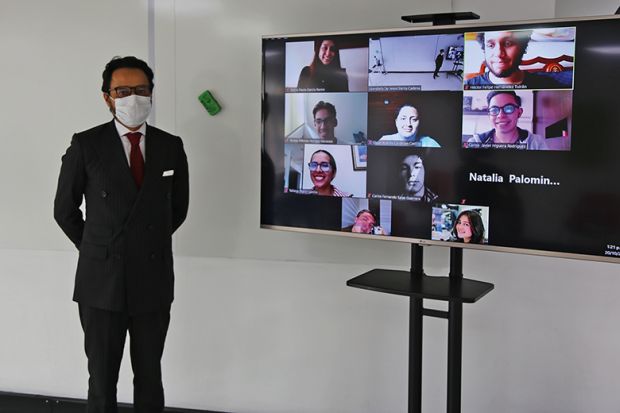Browse the Latin America University Rankings 2021 results
When the coronavirus reached Colombia last March, Del Rosario University was fortunate to be able to react agilely to a challenging situation.
We focused on diverse initiatives that reflected the innovative spirit, the transformative character and the commitment of a determined, collaborative academic community willing to face changes.
One of the most important actions was undoubtedly the transition from a semester with in-person classes to a strategy of remote access to content and resources and hybrid classes.
We implemented the technical and physical infrastructure that supports these modes of teaching with videoconferencing systems, online learning platforms, a digital educational resource centre and access to specialised academic software, as well as classrooms and laboratories to be used from home. Clear road maps for students and teachers in remote-access mode supported it all.
During 2020, with the launch of these strategies, we supported more than 13,000 students per semester. We ran 90,443 class sessions in our videoconferencing system and 40,637 recorded classes, with 2,359,005 participants overall (counting each time a student attended a class).
To ensure a smooth operation, we created a plan for training the community in the implementation of this new modality and the use of the basic tools. In this marathon training, which took place when the lockdown began throughout Colombia, we trained more than 7,000 users in three days, including students and teachers. Meanwhile, in the second semester of 2020, we developed a virtual teacher-development course that has certified 97 per cent of the core group of teachers and launched a portfolio of resources, workshops and mentoring for the entire community focused on the basic and advanced use of ICT, emotionally safe classrooms, didactics and pedagogy, and institutional biosafety protocols.
Our approach can be understood as a model with four main nodes:
- Renovated learning: Del Rosario University showed its commitment to the construction of a diverse and flexible academic offering with courses using in-person, remote and mixed modalities that allowed students and teachers to choose between a responsible and controlled return to the campuses or completely remote participation. They were thus able to enjoy a unique and enriched learning experience, with academic options and personalised calendars. The university was equipped with Aula+ disruptive classrooms to support mixed strategies that simultaneously serve in-person and remote-access students, and encourage collaboration and interaction.
- The PlayBOK (Body of Knowledge) initiative repositioned the university experience beyond a classroom or the simple transmission of knowledge. It integrated the design of a complete agenda of extracurricular activities with integral activities for well-being, a re-energised campus and student experience, spaces for conversation and dialogue outside regular classes, and a series of activities, resources and services to encourage mental, physical and emotional fitness during these trying times.
- The Teaching and Learning in Times of Transformation strategy created a space for training and support and for the construction of subject guides and course designs to reflect the new learning modalities that had been developed. This resulted in new pedagogical practices that allowed meaningful interactions adapted to each modality and new tools, resources and materials to stimulate other ways of learning. It also led to a learning support system with new forms of student guidance and support services and new digital laboratories and the provision of resources and tools that enrich the teaching and learning experience for all.
- The #URosarioContigo strategy focused on supporting students with financial difficulties. This initiative was based on principles of resource optimisation, targeting mechanisms to serve the most vulnerable population, agility, and effective and strategic communication to publicise how to access economic aid. With this strategy and with updated information on students and their financial needs, the portfolio of funding options was expanded, enabling the enrolment of many students.
We do not intend to give the recipe for tackling an avalanche of trends around technology and the future of higher education institutions, but rather to show how digital transformation can create new options of spaces, services and platforms that strengthen the academic and student experience.
This commitment forms the heart of Route 2025 – our strategy defining what the university will be like in four years, based on interviews with students, academics, graduates and allies. There will be adaptable and dynamic academic offerings, new campus environments and lifelong education based on the principles of innovation, coherence, diversity and flexibility.
Sergio Pulgarín Molina is vice-president and provost at Del Rosario University.
The THE Latin America University Rankings 2021 will be published at 8pm BST on 13 July.




